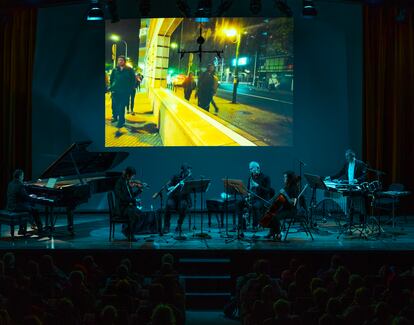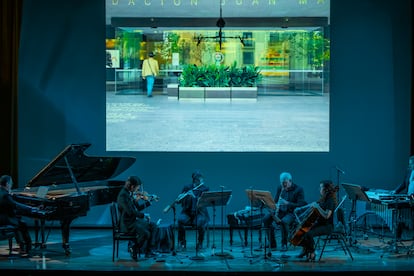César Camarero (Madrid, 1962) is a composer who, under an apparent tranquility, with a clothing of the wild west, hides fire flares that it costs to recognize. The musical theater proposal that the Juan March Foundation has staged this Wednesday, How to upload a stairs without stepsin co -production with the Turina Room of Seville, it is a good sign of what has been said. It is a story told with photonovela, docudrama and thriller to which live music supports from a sound base of quiet beauty.
The substance is that of an alleged detective (everything is assumed here), who follows the steps of a woman from whom she suspects something related to a espionage or some plot with secret keys. Everything is counted from mobile photographs and an off voice that describes operations to another “assumption” colleague. The two protagonists of the story, she and him, are fixed in a video that contains the photos, the voice and, at some point, a significant video.
Formally, waiter, composer and creator of the entire intrigue, defines the experience as an existential drama and there is a good track, this docudrama about photos has a lot of an experience like Chris Marker’s in The pier or, to a lesser extent its other film Level fiveand, as in them, also a waiter presents an enigma to solve. The first of the enigmas is clear immediately, he discovers that someone sneaks into the photos, who observes the observer, who possibly follows the one who follows her. And that mirror, perhaps the murderer, if there is a crime, is none other than the waiter who comes out thus dressed in a hat and a visible beard, both in the photos and in the end, when the composer himself appears on the scene with similar clothing and delivers something to the pianist with the same secretism as seen in the images.
That idea that perhaps the murderer is the author himself also refers us to another great French creator, Georges Perec, the one who wrote a whole novel of events in which the letter E was missing and that, in the end, it is discovered that the disappearance (the disappearance (the disappearance (the disappearance (the disappearance (the disappearance (The disappearance) that they are investigating is that of that missing letter. The text, anyway, derives from a story by the American Stanley J. Reeve re -tabajada by Virginia Nogueira.
But there is something more disturbing. In the midst of the plot, she appears on video this time to show a kind of dissertation in which he tells us about a little known episode in which a journalist from the old newspaper Pueblo Interview with a “death sentence for a false crime” and that had managed to sneak out of justice for more than three decades. For that article, the journalist had been sentenced to several months in jail he met, it was the year 1970 and in Franco he did not join with those things. That journalist was called Julio Camarero, and his memory leads us to that “wild” journalism that some names, Pérez-Reverte, Raúl del Pozo, Carmen Rigalt, José María García …
In a recent article of The day De la Rioja, signed by Javier Villahizán, thus described the imprisoned journalist: “One of those illustrious was Julio Camarero who, before becoming a correspondent and editor -in -writing through events. In that department he did everything for an exclusive, from impersonating police to steal the photos of the deceased to cut the passage to the rest of the journalists who were going to cover the news.”
All composers are liars
At the end of the piece, a poster indicates that it is dedicated to Julio Camarero, “my father.” In sum, the piece investigates something that is nothing other than the mystery of that legendary father of the musician. The composer quotes the Paradox of Epimenides, Tunisus: “All composers are liars”, but the real problem lies in another script turn, sometimes the composers tell the truth.

And how does this interesting plot work with contemporary music as a support and an intelligently schematized video? That is the million dollar question, especially because this proposal, debtor of traces of the avant -garde of the twentieth century and with the intention of investigating new ways of telling stories, has few background and everything that is novel without being scandalous always has more difficulties of normal to be admitted. If I have to risk a personal opinion, I find it fascinating. It is not opera, it is not theater, it is not cinema or is a concert and, nevertheless, all the genres cited are involved. In my view, it also has another virtue, it is extraordinarily economic, it shows that it is possible to tempt other ways to count without excess production.
With regard to the artists involved, the mention of the Sound Workshop Group of Seville is forced and outstanding. This excellent sextet of contemporary music does not need to demonstrate anything to what already done in a demanding artistic career of more than 25 years. The music that a waiter has written to them of an unusual temper, must count without counting, keep the pulse from a kind of beats that show few fluctuations but that support interest. It is difficult music, as is a waiter in general, but without perceiving as such. In addition, group members have been involved in tasks such as the production design, carried out by the pianist Ignacio Torner, or the sound effects, in charge of Baldomero Llorens percussionist. It is, in sum, a team success to which the phrase of actor Manolo Caro, expressive and pregnant with nuances of the old detective, and the actress Rocío de Frutos must be added, who walks through a Seville away from the topics, sowing mysteries and always distant, as are always the characters that have things to hide.
‘How to upload a stairs without steps’
Music. César Camarero.
Text. Virginia Nogueira, from Del Report A shadow’s Life from Stanley J. Reeve.
Department. Rocío de Frutos, actress in photographs and video; Manolo Caro, actor, voiceover. Sound Workshop.
New production of the Juan March Foundation and the Turina Space of Seville.
April 30 and May 1. Juan March Foundation of Madrid.

